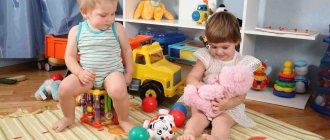One of the most important periods in a child’s life, which can have a huge impact on his further development, is the period from the first to the second year. At this time, he grows very intensively and every day acquires new skills and experience in interacting with the people around him. But, if the physiological development of a child from one year onwards has been studied quite well, then the problem of education during this period is quite acute.
Education after one year occurs simultaneously with developmental activities
Basic needs of a child in the first year of life
Developmental psychology identifies two basic groups of needs of children of this age:
- Physiological needs. The physiological needs of a one-year-old child include the need for food, water, sleep, warmth, and proper rest.
- Psychological needs. Needs for safety, emotional close communication with parents, need for knowledge of the world around us
Despite the fact that formally these groups of needs differ significantly from each other, it is quite difficult to draw clear restrictions between them. The main reason is the close relationship between them, which is formed from birth and continues throughout life.
Contact with mother is the most important thing for a child after one year
For example, feeding a child can satisfy not only a physiological need (eliminating the feeling of hunger), but also a psychological one (close contact, interaction with the mother).
Errors in education
- Inconsistency in the actions of others . One prohibits it, the other encourages it. It’s already difficult for a child to learn a bunch of rules and norms of behavior. Don't create additional obstacles yourself.
- Accusation and threats . Of course, we need boundaries of what is permitted, but if they are violated, you should not intimidate the child too much. You want to raise a self-confident, proactive citizen.
- Mood swings . Our mood should not affect communication with our child. Control yourself. Don't take out your anger and irritation on them. Your requirements should always be the same.
- Unreasonable prohibitions . There are things that children should not do, some even dangerous. But your child should clearly know why it is not possible. Ignorance of the consequences pushes us to experiment.
- Hyperprotection . Give your baby freedom. At any age there are things that they can do on their own. Give yourself free time and stimulate their initiative.
- Lack of time . For children, not only our presence is very important, but also communication and interaction. The fact that you come home from work and watch TV together doesn’t mean anything.
Talk, tell about yourself, ask how his day was, what he played, what new things he learned.
Share with your friends!
more
Read us in the Zen channel
What do psychologists say about raising a child under one year of age?
One of the most common misconceptions associated with the psychology of upbringing and development of a child over 1 year old is related to the fact that in the future the child will still not remember what happened to him at that time. This means it is not at all necessary to devote due time and attention to education.
Of course, it is unlikely that any of us will be able to remember the events that happened to us in early childhood, in particular, before the age of two. However, the period from one to two years is the very period when the first mental processes begin to take shape. The child receives the first experience in his life and the first memories of a fairly active (and not passive, as before the first year) interaction with the world around him.
One and a half year old child explores the world
Raising a child must be done from birth - this statement is beyond doubt among any modern psychologist.
Indeed, the sooner the parent begins to invest his attention and care for him, the sooner the first results will be felt. Omissions made even in the early stages can result in gaps in education, which will be very difficult to fill for many years to come.
But is it always easy to understand what exactly he is trying to convey to his parents? More often than not, even the simplest emotional reactions cause the most ambiguous reaction from his relatives.
The baby begins to be interested in communicating with peers
Characteristics of the age period
When a child turns one month old, parents notice significant changes in his skills and behavior:
- shows independence;
- speaks the first words;
- walks, runs;
- studies surrounding objects with interest.
The baby’s activities are aimed at learning objective functions and tasks. He copies the actions of his parents, imitating their behavior. It is necessary to voice the manipulations that an adult performs. It is important to spend time together: stacking cubes, looking at pictures in books.
By the way! In the first three years of life, the baby goes through half the path of mental development.
Raising children over the age of one year requires reflection and understanding of children's actions. The baby begins to understand how to interact with objects, comparing his endeavors with those of his parents.
The period is characterized by the beginning of the formation of personal qualities: self-esteem, self-esteem, self-awareness. Children's speech is rapidly developing and their vocabulary is expanding.
A good way to monitor a child’s skills is to create a development calendar where the child’s acquired skills are recorded.
There are a number of critical points that serve as guidelines for adults. If the child is in
- 1 year and 4 months does not understand the purpose of household items;
- 1 year and 2 months does not imitate the actions of others;
- 1 and 6 months the baby cannot walk;
- 1 year and 5 months pronounces less than 15 lexical units;
- I haven’t learned how to write sentences for 2 years.
The physical and intellectual characteristics of each baby are individual, so the pace of development is different.
Crying in a child over one year old
At the age of one to two years, the child’s psychology is still such that he does not yet have the means of interaction with his parents, and his only way to attract attention is to cry. As a rule, it can indicate a complaint about a physical condition (when he has a stomach ache, an uncomfortable position in bed, etc.), and a need for attention, and frustration of some need (hunger, thirst, etc.). ).
After the first year, the child’s opportunities for interaction with parents expand somewhat. But, nevertheless, he prefers to communicate with them through simple expressions of emotion.
A child's crying is a way to express himself.
How to respond to a child's cry? Most often, parents in such situations are characterized by two unhealthy extremes: some run to calm their children down immediately, forgetting about all household chores. Others prefer to ignore his emotional manifestations, believing that in this way he is simply trying to attract attention to himself, and excessive care can spoil the child, spoiling him.
As a rule, the first point of view is adhered to by supporters of the child-centric approach. They consider close contact of a one-year-old child to be absolutely normal and natural and prefer not to limit the child’s time together. The second, more traditional approach is more rigorous. His supporters see the need to wean him from demanding his way by crying and screaming from a very early age, moving on to more mature methods of communication.
He doesn't understand me!
At one year of age, the baby already understands spoken speech well, but not cause-and-effect relationships. Therefore, you should not expect him to understand as an adult.
The child does not yet have life experience and many “don’ts” seem absurd to him. For the same reason, you should not expect perfect obedience from him. He wants to explore the world and better remove all valuable objects from his access area.
At the same time, you shouldn’t babysit with him. Such simplification of speech negatively affects the formation of an active vocabulary, i.e. words that the baby must pronounce himself.
Any instructions for a child should be:
- short;
- monosyllabic;
- as easy as possible to understand.
Example: Take a toy elephant. Incorrect option: take the toy elephant and don’t dare touch the pink hippopotamus, now we’ll go to grandma.
One-year-old children do not yet perceive the categories of time. They live in the present moment, so in the event of hysterics, they easily forget the cause of the disorder.
If a parent wants a child to understand him, an adult needs to treat him on the same level. At the age of one, the baby is not yet able to manage abstract concepts and the promise of a gift will not have an educational effect in the future.
Therefore, the best option is an exchange right away. Example: you can’t eat chocolate because of an allergy, but I can buy you a banana or cottage cheese.
How to find the golden mean in parenting? Tips for parents
- First of all, it is necessary to determine why the child is crying. Despite the fact that at this age children are really capricious, their crying can sometimes hide quite serious reasons - for example, a feeling of hunger, thirst, or illness.
- Despite the well-established belief of many that “crying is useful because it develops the lungs and stimulates the child’s breathing,” this, in any case, is a signal that the child is experiencing discomfort. This means that one way or another he needs parental help. In addition, screaming exhausts a person physically, taking away a lot of his physical resources.
- Many parents are afraid to immediately respond to their child’s crying, for fear of spoiling him. In fact, as we have indicated, it is almost impossible to spoil him before two years of age - this phenomenon begins to make itself felt closer to three years. In addition, as we have already indicated, for children of this age, screaming is, although not the only, but the main way available to them to inform their parent about what is bothering him. Of course, as the child grows up, it is necessary to explain to him that there are other ways of expressing his dissatisfaction, resentment, discomfort, etc. But first you need to learn to respond to his manifestations of emotions in the simplest form.
- Psychology warns: ignoring a child’s crying often leads to the development of various disorders, from sleep disorders to neuroses. This is why it is important to calm him down very gently and then take the measures he needs.
Storm of emotions
Until one and a half to two years old, a child needs very few words to be understood. He babbles or points at the desired object. If his mother does not understand him or does not consider it possible to give him what he wants, he begins to cry, stomp his feet, and express aggression. Some children, having not achieved what they want, are able to quickly switch to something else. Others find themselves so caught up in their emotions that they can’t stop and calm down. This is a difficult test for parents who themselves find themselves in the grip of conflicting feelings. Anger at the raging child is mixed with pity for the little “sufferer.” And you are torn between the desire to give in to him and firmly stand your ground.
Nurturing a child's independence up to one year old
Another issue that causes a lot of controversy among supporters of various approaches to education is related to the development in an infant of such a quality as independence. At what age should a child sleep separately from his parents?
Teaching your baby to be independent
Just like on the issue of children's crying, opinions on raising a child's independence are also divided. And if some psychologists insist that even after a year the child should be practically inseparable from his mother (and close contact will compensate for the stress received at birth), others insist that the sooner the child becomes autonomous from his parents, the better this will affect on its development in the future.
And raising any child from 1 to 2 years old cannot do without developing his independence and autonomy.
At 2 years old, children can organize independent play
And although each of these approaches is justified in its own way, the criterion for the correctness or incorrectness of upbringing can only be the condition of the child himself. What do psychologists themselves advise in such a situation?
- Parents who pay a lot of attention to their child under two years old do not risk raising an insecure and fearful person. Interest in the people around you and curiosity are precisely those qualities that can only be cultivated in a psychologically favorable and comfortable environment.
- Research has confirmed that parents who spend a sufficient amount of time with children under two years of age help them develop such qualities as sociability, empathy (the ability to understand the mood of another person), and emotional sensitivity. This is achieved due to the fact that communication with parents is the first and, undoubtedly, invaluable experience of interacting with people.
- When communicating with a child, there is no need to strive to do all the work for him, overly patronizing him. Parents who abuse this deprive the child of independent experience of activity.
- You need to gradually accustom a child under two years old to sleep independently. If the child experiences difficulties and is capricious at first, and also shows signs of anxiety and fear, you should not transfer him to the parent’s room. It is enough just to sit near his bed for a while and calm the child to rest. But this should not be done immediately, but gradually.
The 3-year crisis may begin much earlier
Potty training
Potty training should begin at 1.5–2 years. But it must be taken into account that the development of physiological processes in children is uneven. There is no need to worry about this, gradually every baby will develop the habit of going to the toilet, it just takes longer for some.
What not to do when potty training:
- It is impossible to force. It is impossible to ensure that the child asks to go to the potty every time he wants to go to the toilet. You need to come to terms with the fact that at first he will be forgotten.
- Start training ahead of time. No matter how much parents would like to teach their child to go potty early, children under 1.5 years old are simply not capable of this. Most children master the potty by age 2.
- Move the pot far away. The baby should be able to use the potty without adult help.
- Use diapers at home. Sure, diapers are convenient and save a lot of cleanup and laundry, but wearing diapers all the time will bother your baby.
- Scold the baby, demanding obedience. Most modern potties have a variety of designs that are attractive to children. They are made in the form of toys, bright and beautiful - children are interested in using them.
- Distract your child when he is busy. If the child does not show a visible desire to go to the toilet, there is no need to tear him away from the game and force him to sit on the potty.
What skills should a child develop by the first year?
Developmental psychology states that raising a child between one and two years of age should ensure the development of the following skills:
- Independent movement around the apartment.
- Isolating in the space around him objects that are of greater interest to him, people who are more pleasant for him to communicate with.
- Development of autonomy and independence from parents.
- The first manifestations of curiosity and interest in the world around us.
- Gaining experience in the first types of independent activities.
Joint activities are the best way to educate.
By the age of two, the child becomes even more active and inquisitive.
His cognitive processes develop and the first rudiments of character begin to make themselves known. It is very important that at this time he feels full support from his parents and other people significant to him. leave a comment
Why is it useful to help parents?
Homework is necessary not only for developing abilities, but also for teaching discipline. Many people think that in the first year it is too early to “load” the baby. Not only is it possible, but it is also necessary. For example, ask him to bring something or arrange toys.
The child will be happy to help. Over time, you can entrust more complex work.
The basic rule is that the request should be formulated by explaining specifically and precisely where the item should be taken.
Remember that a child cannot retain information in full, so each instruction should mean one action. Early “labor education” develops memory and attention, during which children remember and perform certain duties.











